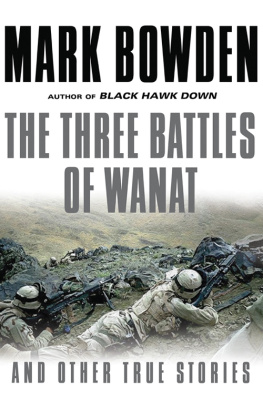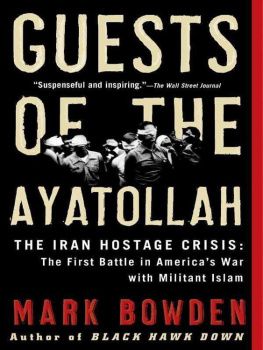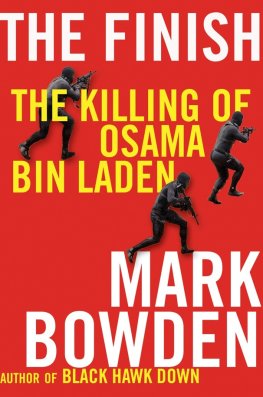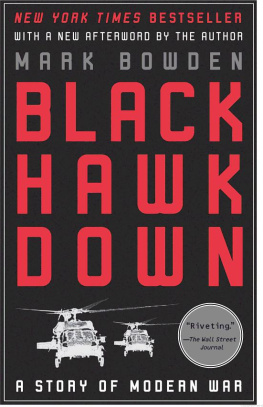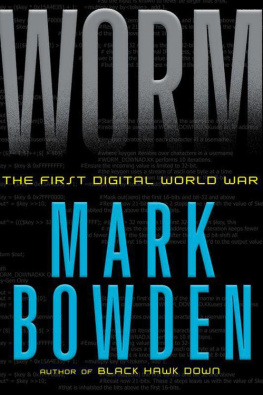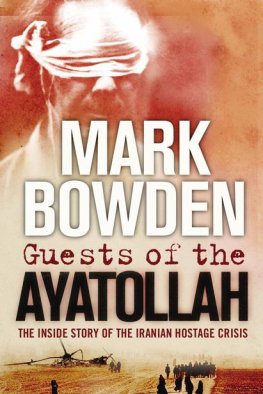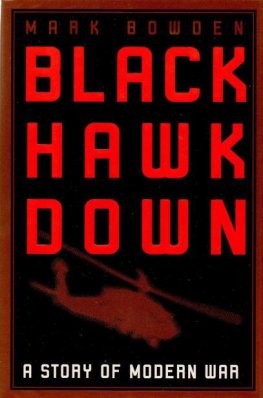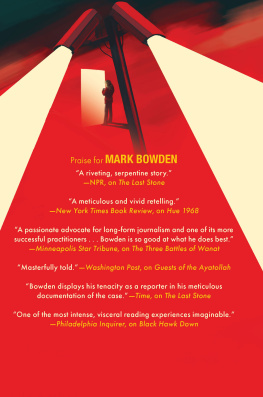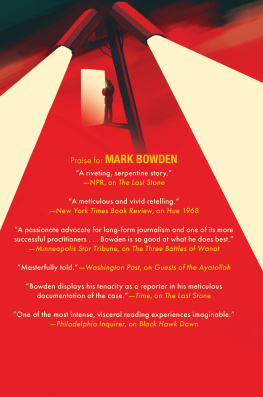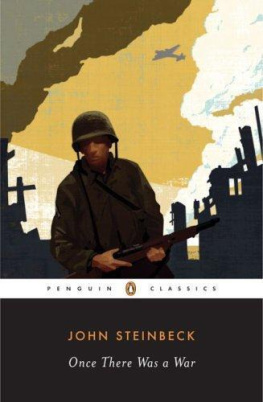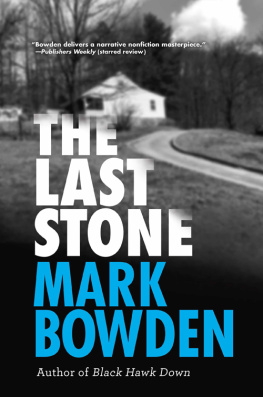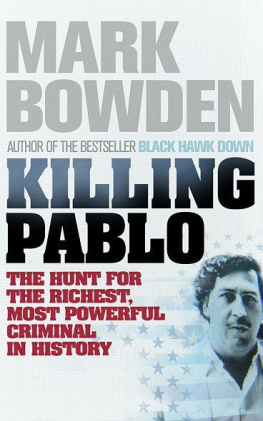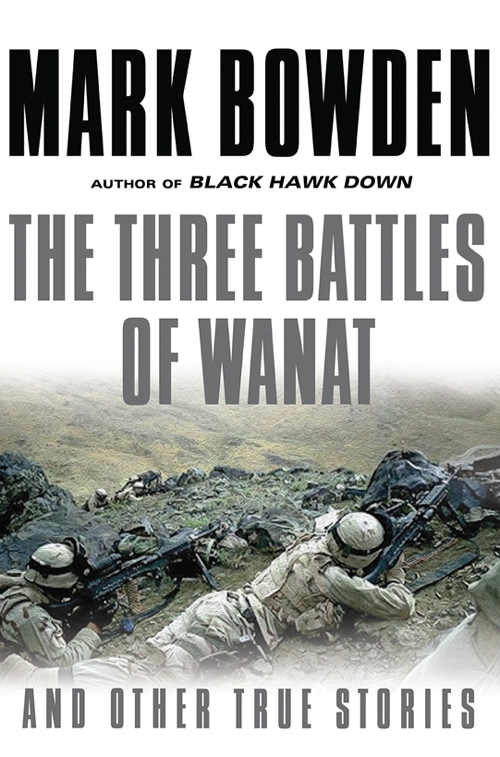The Three
Battles of
Wanat
and Other True Stories
Mark Bowden

Copyright 2016 by Mark Bowden
Jacket design by Marc Cohen
Author photograph Pascal Perich
The Three Battles of Wanat (originally published as Echoes from a Distant Battlefield), The Inheritance, and The Bright Sun of Juche (originally published as Understanding Kim Jong Un, the Worlds Most Enigmatic and Unpredictable Dictator) originally appeared in Vanity Fair
The Ploy, The Last Ace, The Killing Machines, Jihadists in Paradise, Just Joe (originally published as The Salesman), The Angriest Man in Television, The Measured Man, The Hardest Job in Football, The Man Who Broke Atlantic City, The Story Behind the Story, The Great Guinea Hen Massacre, Rebirth of the Guineas, Cry Wolfe, Abraham Lincoln Is an Idiot (originally published as Idiot, Yahoo, Original Gorilla: How Lincoln Was Dissed in His Day), Dumb Kids Class, and Zero Dark Thirty Is Not Pro-Torture originally appeared in the Atlantic
Attilas Headset originally appeared in the New Yorker
Saddam on Saddam originally appeared in the Philadelphia Inquirer
The Silent Treatment originally appeared in Sports Illustrated
All rights reserved. No part of this book may be reproduced in any form or by any electronic or mechanical means, including information storage and retrieval systems, without permission in writing from the publisher, except by a reviewer, who may quote brief passages in a review. Scanning, uploading, and electronic distribution of this book or the facilitation of such without the permission of the publisher is prohibited. Please purchase only authorized electronic editions, and do not participate in or encourage electronic piracy of copyrighted materials. Your support of the authors rights is appreciated. Any member of educational institutions wishing to photocopy part or all of the work for classroom use, or anthology, should send inquiries to Grove Atlantic, 154 West 14th Street, New York, NY 10011, or .
Published simultaneously in Canada
Printed in the United States of America
FIRST EDITION
ISBN 978-0-8021-2411-1
eISBN 978-0-8021-9066-6
Atlantic Monthly Press
an imprint of Grove Atlantic
154 West 14th Street
New York, NY 10011
Distributed by Publishers Group West
groveatlantic.com
16 17 18 19 20 10 9 8 7 6 5 4 3 2 1
For John Hersey
I am particularly grateful to Vanity Fair and the Atlantic for supporting not just me, but so many other journalists intent on treating ideas and stories in depth. In my early work as a newspaper reporter I often felt that my finished stories had just scratched the surface. Like many reporters, I was in a running battle with my editors for more time and more space. Fortunately, I have had very sympathetic editors. Deeper investment usually resulted in a richer story.
Take, for example, Wanat, the title story of this collection. When my editor at Vanity Fair, Cullen Murphy, first suggested it to me in August 2010, I envisioned it as a detailed account of a tragic 2008 battle in Afghanistan that had left nine American soldiers killed and twenty-seven wounded. I had not written a story about combat since Black Hawk Down ten years earlier. This new one concerned a mountain combat outpost under construction that had been attacked by a large Taliban force and nearly overrun. When I began I imagined a story much like the one I told in that book.
But true stories are never alike. The more you stir, the thicker the stew. I was surprised to discover, when I started reporting, that there had been not one but several detailed investigations of what had happened at Wanat. The one that had received the greatest attention was a preliminary draft of a study by the U.S. Army Combat Studies Institute. Written by Douglas Cubbison, a contract military historian, it was sharply critical of the army units involved, placing blame for inadequate defenses at Wanat on poor command decisions.
Cubbisons draft had inspired detailed stories by the Washington Post, by NBC News, and by the noted military affairs blogger Tom Ricks. It was indeed rare for a study from that source to be controversial, and especially for it to be so sharply critical of officers still serving. One of the things that made Cubbisons take on Wanat so attractive to reporters was the poignant human story behind it. The institutes study had been instigated by Dave Brostrom, the father of Jonathan Brostrom, a young lieutenant who had been killed in the fight. Dave Brostrom, a retired army colonel, had examined detailed reports about the incident, and had become convinced that the death of his son and the others at Wanat had resulted from incompetent or reckless leadership. When I spoke with Cubbison it became clear that Dave Brostrom not only had requested the report but had played an important role in shaping it. The story of a career army officer determined to hold his peers accountable was irresistible.
But after meeting Dave Brostrom; Lieutenant Colonel Bill Ostlund, the officer who bore the brunt of his criticism; and others involved up and down the command chain, I found a story far more complex than that. It involved a grieving father troubled not only by command decisions in Afghanistan but also by his own role in placing his son at that vulnerable combat outpost. It involved commanders struggling to fulfill a difficult mission with limited men and resources at a time when the primary American military focus had shifted to Iraq. The string of reports and findings ended, ironically, by faulting, of all people, Jonathan Brostrom. Vanity Fair published my account in December 2011, nearly a year and a half after Cullen first suggested it to me. Without the time and editorial support to fully explore all of these branches of the story, and to travel and meet personally with those directly involved, I would never have been able to arrive at my own fuller understanding of what happened.
However my own use of the opportunity is judged, magazines (now also websites) that encourage long-form reporting and writing are carrying on one of the great traditions in American journalism. From the work of abolitionists who recorded the brutal practices of slave owners; Nellie Blys famous trip to a madhouse for the New York World; Ida Wellss courageous documentation of lynching; the powerful exposs of Lincoln Steffens, Ida Tarbell, Upton Sinclair, and the other great contributors to McClures in the early twentieth century; and the work of John Hersey, Gay Talese, and Truman Capote to the flamboyant New Journalists of Rolling Stone, Ramparts, Harpers, and Esquire who so inspired me as a college student, journalists free to explore every branch of a complex story have produced a body of work every bit as important to the canon of American literature as that of novelists, poets, playwrights, and screenwriters.
I see more of it today than ever, even as print publications dwindle. The Internet affords, if anything, a superior platform for every kind of journalism, and I have no doubt that long-form narratives will remain essential. Prose is the most subtle and precise form of communication: the language of thought itself. No other medium is capable of so deeply exploring and explaining human experience. At the same time that headlines and images flash around the world on cell phones instantaneously, time and again we learn that our initial take on a story is incomplete and often wrong. Whether its social media prominently fingering an innocent man in the days after the Boston Marathon bombing, or early reports of a trench coat Mafia from the scene of the Columbine High School shootings, until an independent reporter is turned loose to dig deeper and write longer, we dont understand what really happened. This is true of the stories we think we know, and also of those we would never hear if journalists were not encouraged to follow their own noses. We would never, for instance, have heard the story of Henrietta Lacks, whose fatal tumor was used to create the cell line for cancer research worldwide, or of a quirky investor like Steve Eisman, who famously foresaw the clay feet of Wall Streets collateralized debt obligations, and cashed in when the stock market crashed in 2007. In both of these cases, it was the professional curiosity and unique talents of Rebecca Skloot and Michael Lewis that uncovered stories essential to our understanding of the modern world.

